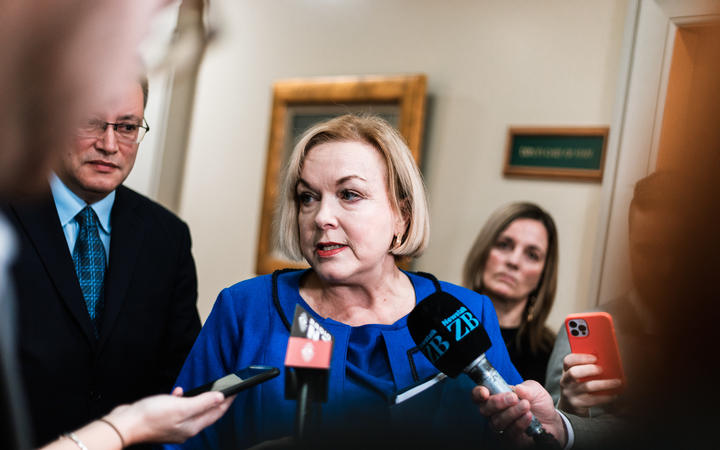New Zealand’s vaccine certificates are coming but they’re “far too late”, National Party leader Judith Collins says.
 National Party leader Judith Collins. Photo: RNZ / Samuel Rillstone
National Party leader Judith Collins. Photo: RNZ / Samuel Rillstone
Yesterday, Prime Minister Jacinda Ardern announced Cabinet had agreed to the use of vaccine certificates in Aotearoa, and they were likely to be a digital Covid-19 vaccination certificate containing a QR code.
Today, National Party leader Judith Collins told Morning Reportthe government should have been working on vaccine certificates a long time ago.
“The UK had one since May, the EU since June and now it appears from the roll out that we saw yesterday … that we now have IT people at the Ministry of Health working on one.
“It’s just far too late.”
Covid-19 response Minister Chris Hipkins told Morning Report the term certificate was likely to be used to “differentiate between what you need for international travel and what you need to use domestically”.
The government was working to make sure a verification system meant it could not be forged.
“There will be a system where those who are scanning people in will be able to verify that the name on the QR code matches the name that’s registered against the vaccine.”
The certificate was “aimed at places of particular risk”, Hipkins said.
The government had not made final decision about where the vaccine certificate would be used, he said.
“But you know, we have given some early indications of places that are highly likely to see it used including events … at this point the sorts of things that we are talking about are things like, you know, events or hospitality venues.
Mandatory vaccinations
Meanwhile, Collins said vaccine mandates would not work until vaccine certificates were in place.
The government’s priority should have been making vaccine information available to employers, she said.
“At the moment, with the government still not having its rollout of a vaccine certificate, it leaves us absolutely nowhere with it because it doesn’t matter what we talk about with mandating and saying all these things, the fact is nobody can actually prove that they’re vaccinated in an easy fashion,” Collins told Morning Report.
“We’re getting the cart before the horse in that case.”
As for mandatory vaccinations, Collins said: “National is very clear that we believe in personal responsibility and we believe in private property rights and so every business, every activity, every work institute, workplace has to make their minds up based on the health and safety legislation.
“If the government can’t even mandate for its own workers, teachers, police, corrections officers and others – health workers – then it’s pretty hard to expect businesses to do it, so the government needs to come up with their plan of how they’re going to do it.”
Asked if National would bring about a law change to made vaccinations mandatory, Collins said: “Well, many employers are asking for a law change … so they have some certainty, but my point is very clearly you’ve got to weigh personal responsibility and rights.
“The government hasn’t been able to do it for its own stuff, so I doubt whether they’re going to be able to do it for everyone else.”
As for the issue of making vaccines mandatory for entry to certain businesses or services – supermarkets or domestic flights – Collins said: “We believe in private property rights and every business has the right to be able to decide who is allowed into the business.
“The other point, though, is that when you’re talking about food or anything like that, you’ve got to have other things in place to make sure that no matter what, that people can still access food and there are and whatever their requirements are
“I think the domestic flights the issue is ‘what is the risk’ and every airline has to take that into account.
Collins said businesses could “exclude anybody they want to for any reason”.
“That is actually the law, that is a private property right.”
But the main issue was really the vaccination rate – and it needed to go up, Collins said.
Hipkins said a decision on whether vaccines would be mandatory or not for teachers should be made in the “next week or so”.
“Cabinet will be talking about that on Monday, so we’ll be looking at teachers alongside our frontline health workers and we’ll then make further decisions on that.
“You can expect to hear more about that next week.
“We’ve been out there consulting with those relevant workforces including the education workforce is and the health workforce before we make mandatory requirements. Before we put them in place, we do some consultation.”
